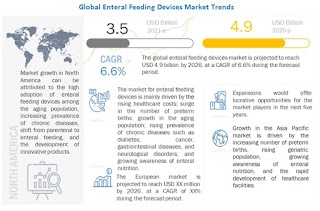Enteral Feeding Devices : Analysis of Potential Market Opportunity Worth USD 4.9 billion by 2026
This report aims to provide detailed insights
into the global enteral
feeding devices market. It provides valuable information on
the type, procedure, application, and region in the market. Furthermore, the
information for these segments, by region, is also presented in this report.
Leading players in the market are profiled to study their product offerings and
understand the strategies undertaken by them to be competitive in this market.
Revenue
Growth Analysis:
The Enteral
Feeding Devices Market is projected to reach $4.9 billion by 2026
from $3.5 billion in 2021, at a CAGR of 6.6% during the forecast period.
Download PDF Brochure:
https://www.marketsandmarkets.com/pdfdownloadNew.asp?id=183623035
Key Factors Driving Market Growth:
The
increasing as rising healthcare costs; surge in the number of preterm births;
growth in the aging population; rising prevalence of chronic diseases such as
diabetes, cancer, gastrointestinal diseases, and neurological disorders;
growing awareness of enteral nutrition; and rapid improvements in healthcare
facilities in emerging countries are expected to further drive the enteral feeding
devices market during the forecast period. Moreover, the shift from parenteral
nutrition to enteral nutrition and growing adoption of and demand for enteral
feeding tubes in home and ambulatory care settings are also expected to drive
the market in the coming years.
Shift from Parenteral to Enteral Nutrition:
Enteral feeding is the
delivery of artificial nutrients or medication through the gastrointestinal
tract (including the esophagus, stomach, and the small and large intestine) to
the organs. On the other hand, Parenteral feeding uses the central or
peripheral veins to intravenously deliver nutrients or medication into the
bloodstream with the use of a catheter. Furthermore, the cost of enteral
nutrition is lower than parenteral nutrition. The average cost of enteral
nutrition per patient per day is about 40% of that of parenteral nutrition.
These benefits have led to a significant increase in the adoption of enteral
feeding in various treatment regimes.
High Growth Opportunities in Emerging Countries:
The Asia Pacific region is
expected to offer potential growth opportunities to market players in the
coming years. This can primarily be attributed to the diversified healthcare
markets in this region, the growing incidence of infectious and chronic disorders,
and increasing R&D initiatives to develop innovative medical technologies.
In addition, infrastructural developments in healthcare facilities, increasing
healthcare expenditure, and the low-cost manufacturing advantage offered by
emerging APAC countries are expected to encourage market players to invest in
this region in the coming years.
Request
Sample Report:
https://www.marketsandmarkets.com/requestsampleNew.asp?id=183623035
North America Region to Dominate The Enteral Feeding Devices Market:
North America, comprising the
US and Canada, held the largest share of the enteral feeding devices market in
2020. The market is well-established across North America. Growth in this
market is backed by the increasing prevalence of chronic diseases in North
America, the presence of many well-equipped hospitals, and the gradual shift
from parenteral to enteral nutrition.
Key
Players in Enteral Feeding Tubes Market:
The prominent players
in the enteral feeding devices market are Becton, Dickinson and Company (US),
Danone S.A. (France), CONMED Corporation (US), Cardinal Health Inc. (US), Cook
Medical (US), Moog Inc. (US), Fresenius Kabi (Germany), Boston Scientific
Corporation (US), Vygon Group (France), Nestlé S.A. (Switzerland), B. Braun
Melsungen AG (Germany), Avanos Medical Inc. (US), and Baxter International Inc.
(US), and. Other players in the market are Applied Medical Technology (US),
Amsino International Inc. (US), Omex Medical Technology (India), Danumed
Medizintechnik (Germany), Medline Industries, Inc. (US), Fuji Systems
Corporation (Japan), Kentec Medical Inc. (US), Vesco Medical LLC (US), Dynarex
Corporation (US), Medela Inc. (Switzerland), Alcor Scientific (US), and Romsons
Group of Industries (India).




Comments
Post a Comment